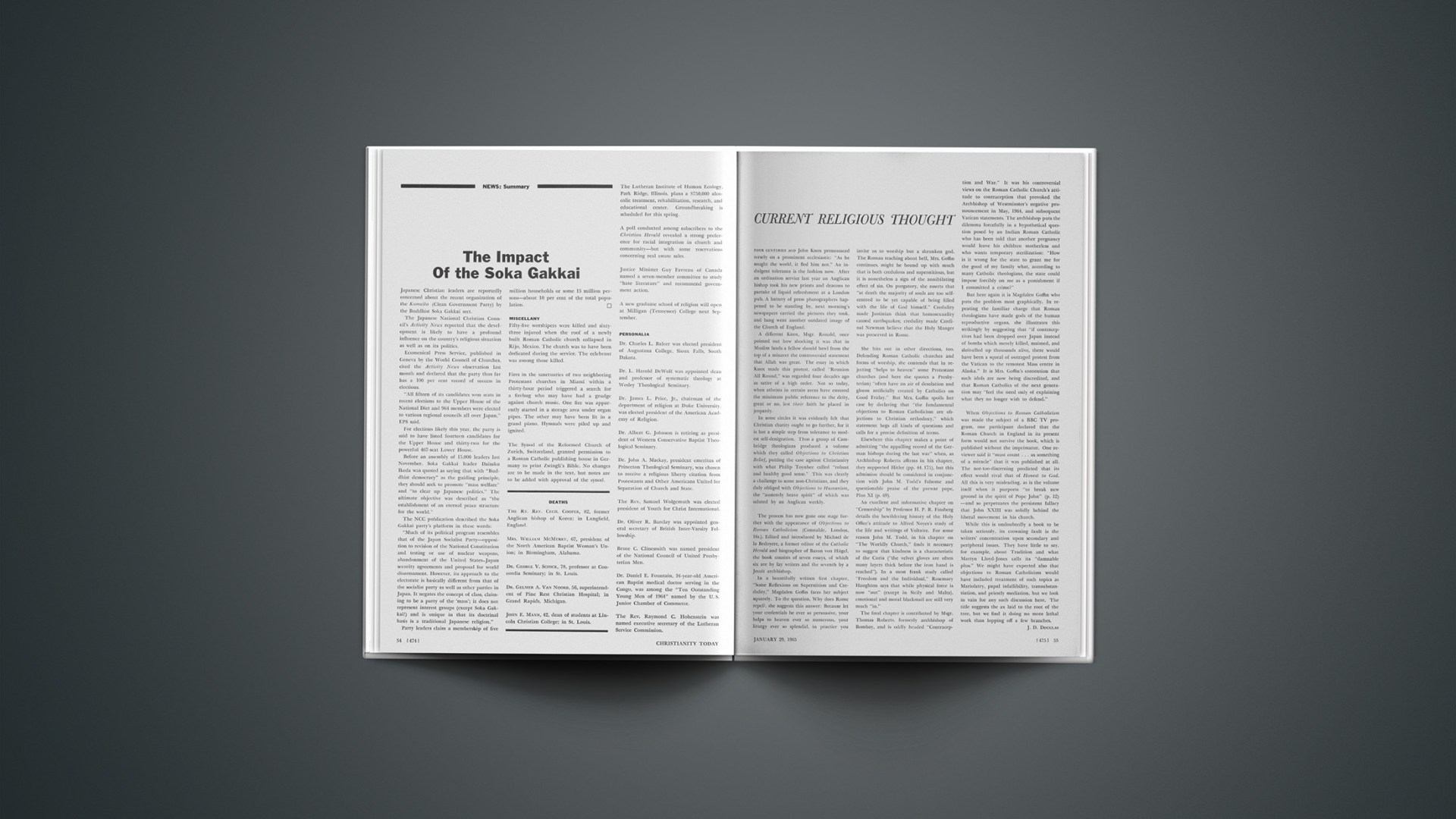Japanese Christian leaders are reportedly concerned about the recent organization of the Komeito (Clean Government Party) by the Buddhist Soka Gakkai sect.
The Japanese National Christian Council’s Activity News reported that the development is likely to have a profound influence on the country’s religious situation as well as on its politics.
Ecumenical Press Service, published in Geneva by the World Council of Churches, cited the Activity News observation last month and declared that the party thus far has a 100 per cent record of success in elections.
“All fifteen of its candidates won seats in recent elections to the Upper House of the National Diet and 964 members were elected to various regional councils all over Japan,” EPS said.
For elections likely this year, the party is said to have listed fourteen candidates for the Upper House and thirty-two for the powerful 467-seat Lower House.
Before an assembly of 15,000 leaders last November, Soka Gakkai leader Daisaku Ikeda was quoted as saying that with “Buddhist democracy” as the guiding principle, they should seek to promote “mass welfare” and “to clear up Japanese politics.” The ultimate objective was described as “the establishment of an eternal peace structure for the world.”
The NCC publication described the Soka Gakkai party’s platform in these words:
“Much of its political program resembles that of the Japan Socialist Party—opposition to revision of the National Constitution and testing or use of nuclear weapons, abandonment of the United States—Japan security agreements and proposal for world disarmament. However, its approach to the electorate is basically different from that of the socialist party as well as other parties in Japan. It negates the concept of class, claiming to be a party of the ‘mass’; it does not represent interest groups (except Soka Gakkai!) and is unique in that its doctrinal basis is a traditional Japanese religion.”
Party leaders claim a membership of five million households or some 15 million persons—about 10 per cent of the total population.
Miscellany
Fifty-five worshipers were killed and sixty-three injured when the roof of a newly built Roman Catholic church collapsed in Rijo, Mexico. The church was to have been dedicated during the service. The celebrant was among those killed.
Fires in the sanctuaries of two neighboring Protestant churches in Miami within a thirty-hour period triggered a search for a firebug who may have had a grudge against church music. One fire was apparently started in a storage area under organ pipes. The other may have been lit in a grand piano. Hymnals were piled up and ignited.
The Synod of the Reformed Church of Zurich, Switzerland, granted permission to a Roman Catholic publishing house in Germany to print Zwingli’s Bible. No changes are to be made in the text, but notes are to be added with approval of the synod.
The Lutheran Institute of Human Ecology, Park Ridge, Illinois, plans a $750,000 alcocolic treatment, rehabilitation, research, and educational center. Groundbreaking is scheduled for this spring.
A poll conducted among subscribers to the Christian Herald revealed a strong preference for racial integration in church and community—but with some reservations concerning real estate sales.
Justice Minister Guy Favreau of Canada named a seven-member committee to study “hate literature” and recommend government action.
A new graduate school of religion will open at Milligan (Tennessee) College next Sep tember.
Personalia
Dr. Charles L. Balcer was elected president of Augustana College, Sioux Falls, South Dakota.
Dr. L. Harold DeWolf was appointed dean and professor of systematic theology at Wesley Theological Seminary.
Dr. James L. Price, Jr., chairman of the department of religion at Duke University, was elected president of the American Academy of Religion.
Dr. Albert G. Johnson is retiring as president of Western Conservative Baptist Theological Seminary.
Dr. John A. Mackay, president emeritus of Princeton Theological Seminary, was chosen to receive a religious liberty citation from Protestants and Other Americans United for Separation of Church and State.
The Rev. Samuel Wolgemuth was elected president of Youth for Christ International.
Dr. Oliver R. Barclay was appointed general secretary of British Inter-Varsity Fellowship.
Bruce C. Clinesmith was named president of the National Council of United Presbyterian Men.
Dr. Daniel E. Fountain, 34-year-old American Baptist medical doctor serving in the Congo, was among the “Ten Outstanding Young Men of 1964” named by the U. S. Junior Chamber of Commerce.
The Rev. Raymond C. Hohenstein was named executive secretary of the Lutheran Service Commission.










